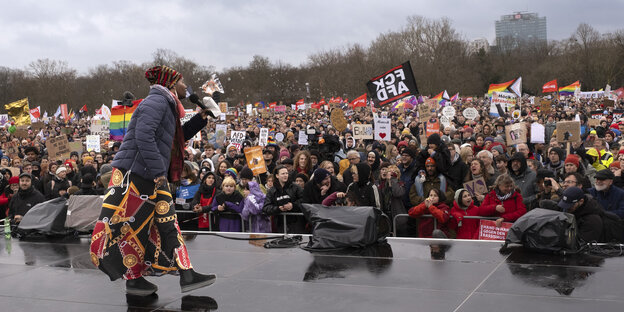In Germany there are large demonstrations against rights. Our author demands: it's time for a black black block.

Speech by Fatuma Musa Afrah at the protest against right-wing extremism in Berlin on February 3, 2024 Photo: Ann-Christine Jansson
It's February again. Each year, Black History is selected for Black History Month and each year the question arises: Who do we commemorate and what do we want to remember?
For some years it was especially about black role models. Who are the role models of art, culture and science who can show that black people don't just shine in sports? In this phase, individual biographies were particularly sought after. Since stars are not my thing and I don't really believe in the concept of individual achievements, last year I was particularly looking for groups and collectives for my articles on Black History: Traces of Black Organizing.
But the question of what aspects of our history we want to consider also includes the question: “What can this year help us understand the present and move us forward?”
In the wake of the deportation plans published by the Correctiv investigation, it is important for many to make clear once again how long black people have been living in this country. To justify why you want to continue staying in a place, it is common to emphasize how long you have been there.
The black movement in Germany has a long tradition.
This doesn't just apply now, it applies to all minorities and marginalized communities. But mere presence is only one aspect. We should remember how long black people and people in this country have been fighting for better living conditions and recognition of their problems and concerns. The first documented networking meeting for blacks in Germany took place in 1895. The African Aid Association was founded in 1918. The purpose of the club? The organization of Africans living in Germany to support each other and as a “replacement of the tribal community and family in the country of origin” – or as we would say: for community building in the diaspora.
What is often lost among the many issues of representation and identity politics: also in Germany there is a tradition of blacks in the labor movement with socialist associations, events and publications. In 1930 the black workers' newspaper was published in Hamburg. The black worker attention to fascist terror against blacks. That was the beginning of the end of active black communities in Germany and the reason why the younger black movement of the 80s almost started again.
Politicize and mobilize
Last year, several obstacles were put in place in Berlin for black people: before the last known addresses of several Afro-German families who were victims of National Socialism.
The lesson of all this horror and loss for black communities must be: we must take care of ourselves and what is important to us. And we have to defend it. In addition to “Black Girl Magic,” it is about political organizing, solidarity, and self-defense. About resistant and anti-fascist movements that politicize and mobilize within black communities.
Maybe now is the time for a black black block. Even if the current demonstrations against the right do not seem particularly attractive to us: we do not need and cannot afford to wait for an invitation.